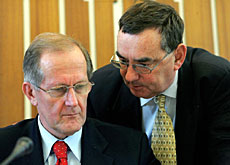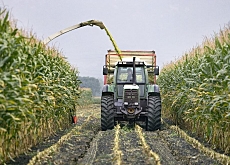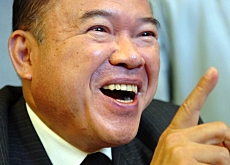Deiss says WTO farm talks progressing

Economics Minister Joseph Deiss tells swissinfo good progress was made at World Trade Organization farm talks in Geneva despite the lack of a breakthrough.
Commenting after the talks broke off on Wednesday, the United States trade representative Robert Portman said he was disappointed that Washington’s offer to cut farm subsidies had not been matched by the European Union.
But Deiss said all sides now knew where they stood and there was still hope of reaching agreement by the end of the year.
Ministers from the EU, US, Brazil, India and Australia – known as the Five Interested Parties – have agreed to meet again next week along with representatives of Switzerland, Japan, Argentina and other countries.
The 148-member WTO needs to agree a blueprint in Hong Kong in December for the final stage of its Doha round of talks. Negotiations are struggling in a number of key areas, of which agriculture is the most pressing.
If successful, this round of talks is expected to give a multibillion-dollar boost to the world economy and may lift hundreds of millions of people out of poverty.
swissinfo: What is your view of the outcome of this week’s talks?
Joseph Deiss: For me the important message is that the process is now underway, that proposals are on the table and that discussions are taking place.
It’s too early to have the breakthrough since the different groups or countries like the US, the EU and the G10 [group of large import countries] have made new proposals. Of course they do not match immediately, there are still huge differences, but the simple fact that we know where we stand… is already very important progress.
swissinfo: What is Switzerland’s position in relation to the different groupings?
J.D.: We are one of the two leaders of the G10 and we have put forward our proposal. It is quite realistic but also quite important and we want it to be a credible proposal. That means not simply tactics but something that can work and we can afford.
On export subsidies, we are prepared to phase them out totally. On domestic support, we are in line with what the other groups are doing – the main trend here is promising.
Finally there are still big problems in market access [tariffs] where we, the G10 group, are firmly opposed to any tariff capping and are looking for flexibility.
swissinfo: How difficult will it be to convince Swiss farmers to accept your end result?
J.D.: It will be very difficult since they will be asked to make very important reforms but on the other hand we are already working on [the reform].
The main outline for agricultural policy for the period 2007–2011 is already known. There we already introduced the elements we need in order to implement the most probable outcome of the rounds.
swissinfo: The US is offering “deep” cuts in its farm subsidies. What is your opinion of that offer?
J.D.: The US is making an important step as far as domestic support is concerned. It is important for us now to see the full consequences for the US. Does this mean a real fundamental change in their agricultural policy?
swissinfo: The EU is now under pressure on market access. What is your opinion of the EU position?
J.D.: The EU position is to some extent going less far than we in the G10 proposed. On the other hand it lacks some essential elements for us like… tariff capping, which they accept and we totally refuse. So there are some major differences and some converging positions.
swissinfo: How optimistic are you that all the parties will reach agreement by the end-of- year deadline?
J.D.: Well I’m optimistic in so far as I’m still at work. The talks have been constructive, open and calm and as long as I think that it’s possible to be done, we will continue.
Key WTO talks in Geneva have ended with no breakthrough on cutting agricultural tariffs and subsidies.
The United States offered to cut farm subsidies by 60%, but called on the European Union and Japan to make bigger cuts in return.
In response the EU indicated it was willing to at least halve its highest tariffs on farm imports, an offer US trade representative Rob Portman said was insufficient.
Key ministers plan to resume talks next week on hammering out an accord.

In compliance with the JTI standards
More: SWI swissinfo.ch certified by the Journalism Trust Initiative




You can find an overview of ongoing debates with our journalists here . Please join us!
If you want to start a conversation about a topic raised in this article or want to report factual errors, email us at english@swissinfo.ch.